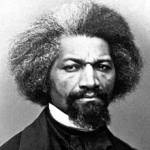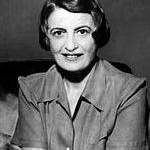Via Classically Liberal, reprising this intriguing connection.
In a letter to his former master, Frederick Douglass explains his decision to escape from slavery:

“The morality of the act, I dispose as follows: I am myself; you are yourself; we are two distinct persons, equal persons. What you are, I am. You are a man, and so am I. God created both, and made us separate beings. I am not by nature bound to you, or you to me. Nature does not make your existence depend upon me, or mine to depend upon yours. I cannot walk upon your legs, or you upon mine. I cannot breathe for you, or you for me; I must breathe for myself, and you for yourself. We are distinct persons, and are each equally provided with faculties necessary to our individual existence.”[1]
In Roark’s courtroom speech in The Fountainhead, Rand delivers these individualist lines:

“But the mind is an attribute of the individual. There is no such thing as a collective brain. There is no such thing as a collective thought. An agreement reached by a group of men is only a compromise or an average drawn upon many individual thoughts. It is a secondary consequence. The primary act — the process of reason — must be performed by each man alone. We can divide a meal among many men. We cannot digest it in a collective stomach. No man can use his lungs to breathe for another man. No man can use his brain to think for another. All the functions of body and spirit are private. They cannot be shared or transferred.“[2]
A striking parallel between two intransigent advocates of individualism and freedom.
Sources: [1] Douglass’s 1848 letter from Frederick Douglas: Selected Speeches and Writings. [2] Roark’s courtroom speech from Ayn Rand’s 1943 The Fountainhead.
Related: Rand in the Philosophers, Explained series.
Ms Rand also said the world is perishing from an orgy of self sacrifice aka altruism. She was right.
Neat comparison!